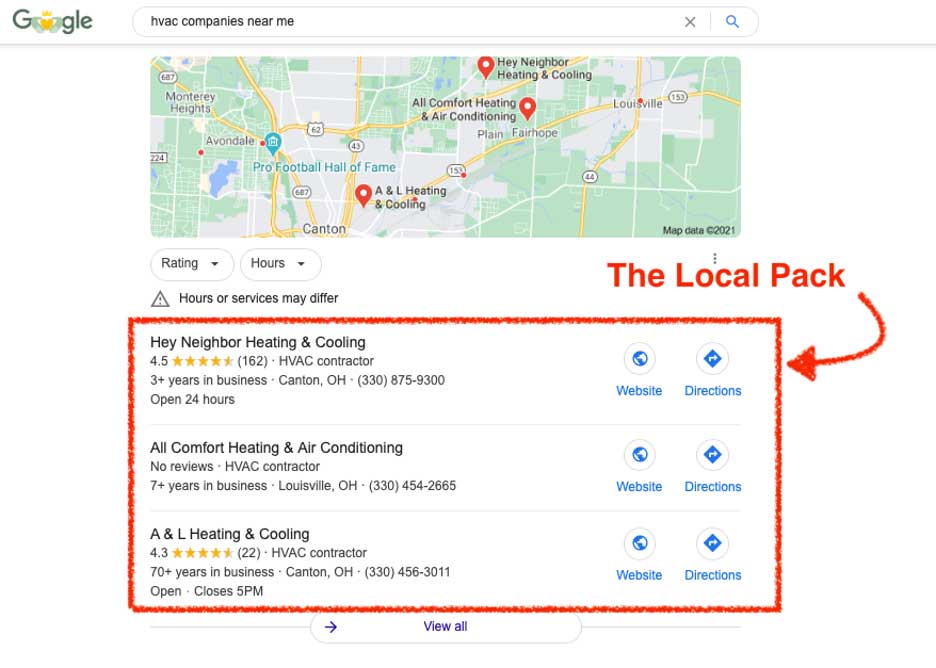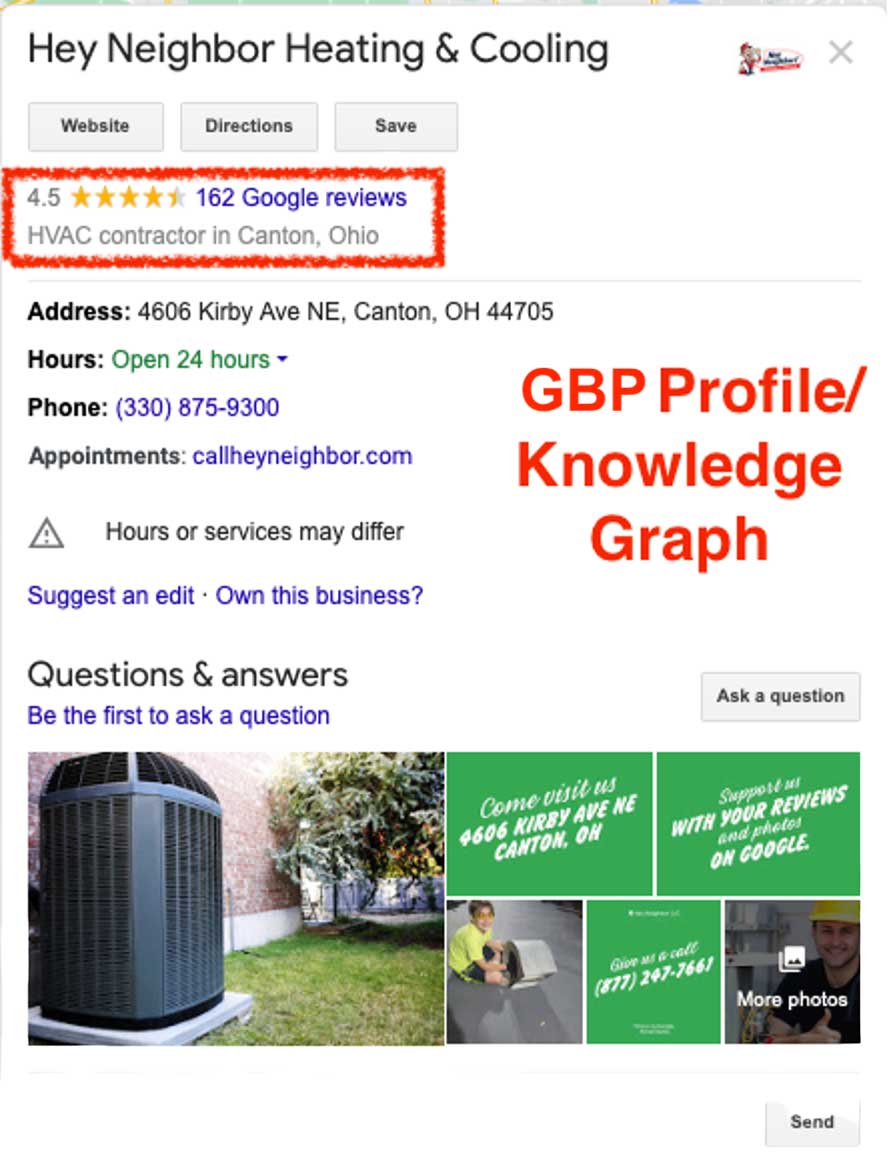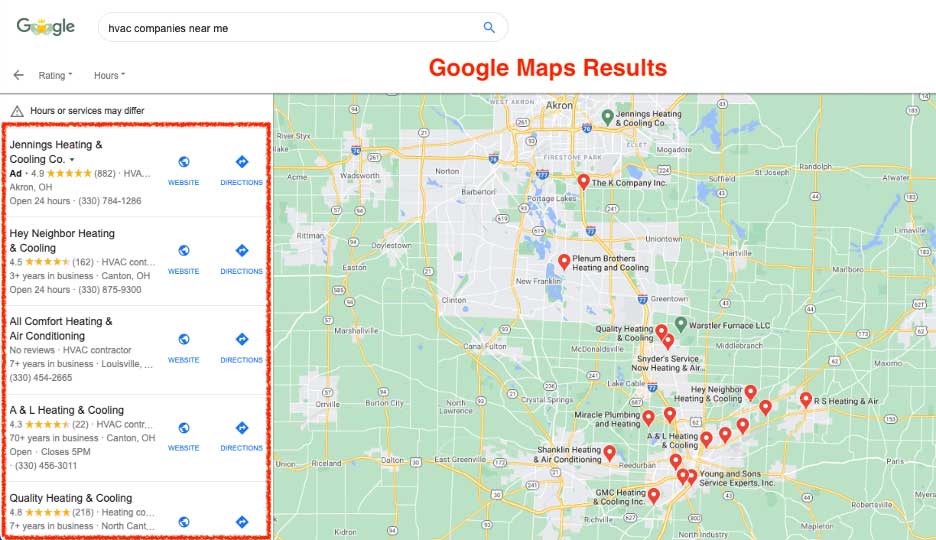You’re not new to owning an HVAC, chimney, or home service business. You already know that online reviews can help you grow your business AND that getting reviews should be part of your marketing strategy. But knowing that reviews are important doesn’t make getting them any easier, does it?
Well, buckle up, because in this guide, we’re going to show you:
- Why reviews need to be part of your marketing strategy (the real impact reviews have on rankings, trust-building, clicks + conversions)
- Why you need to respond to all reviews, both the negative and the positive
- Why you can never stop in your quest to get more reviews for your HVAC, chimney, or plumbing business
- Why you have to have a strategy if you want more reviews for your business
- How to get more clients to leave you service reviews
Let’s get right into it.
Why reviews need to be part of your home service business marketing stagey
#1 Reviews have trust-building power
You’re here because you know you need more reviews. But in case you have any doubts about *just how* powerful and important they are, let’s get into some real stats.
According to the BrightLocal Consumer Review Survey, which might as well be the Gospel on review stats:
- 98% of consumers read online reviews for local businesses in 2021
- Consumers read an average of 10 reviews before feeling able to trust a business.
- Only 3% of consumers would consider using a business with fewer than 2 stars.
- 49% of consumers trust online reviews as much as personal recommendations and 37% trust them as much as recommendations from social media personalities they follow
Those stats tell us one thing for sure: online reviews influence how searchers view your business and whether or not they *trust* your business enough to do business with you.
They tell us that the majority of searchers are looking to online reviews when making a decision about which local HVAC, chimney, plumbing, or other home service company to hire, and that what they find will either build confidence or introduce doubts about working with you.
Okay, what else do reviews do?
#2 Reviews drive clicks and conversions
Their trust-building power is one of the top reasons it pays to get more reviews for your home service business. But their influence doesn’t stop there.
The data shows that having positive reviews can also drive clicks (which we’ll equate with potential leads here) and affect conversions. Take a look:
- Review ratings are the biggest driver of clicks in local SERPs. — BrightLocal Impact of Reviews and Ratings on Click-Through Rates
- 94% of consumers say positive reviews make them more likely to use a business, while 92% say negative reviews make them less likely to use a business. — BrightLocal Local Consumer Review Survey
- Improving your review star rating by 1.5 could equal 13,000 more leads. — Location3 Positive Google Reviews Improve Paid Search Conversion Rates
These stats tell us that there’s a direct correlation between reviews and leads, clicks, and conversions.
Why would reviews have such an impact? The principle of social proof.
Think about who’s using Google to find an HVAC, chimney, or other home service company. These are people who don’t already have ‘a guy.’ They’re uncertain about who to trust, about who to call, and they’re looking for direction. They’re evaluating their options and hoping that one company will stick out as the obvious *right* choice.
Only it’s not usually that easy…
Many HVAC and home service companies look the same on the surface. They offer the same services and products. They have similar pricing. They have the same certifications. They talk about the same things on their websites. So determining who is the safe, right choice is harder than consumers would like it to be.
Dr. Robert Cialdini, who has spent his life studying why people do the things they do says in his book Influence,
“Without question, when people are uncertain, they’re more likely to use others’ actions to decide how they themselves should act.”
He goes on to say:
“The principle of social proof operates most powerfully when we are observing the behavior of people just like us. It is the conduct of such people that gives us the greatest insight into what constitutes correct behavior for ourselves.”
The power of reviews and their ability to influence consumer behavior can be traced to the principle of social proof. The uncertainty people feel when looking for home service companies on Google leads them to look to others for direction. That’s why they’re reading online reviews.They’re looking to see what other people are saying about your company, fishing for clues about what kind of experience they can expect to have. And they’re looking for people like them in situations like theirs, which is why they’re looking at an average of 10 reviews before feeling able to trust a business. They want assurance that you’re the right choice and that choosing you is less risky than choosing a competitor.
Bottom line: If you have very few reviews or you have more negative reviews than positive, those looking for your services aren’t going to find the social proof they need to confidently choose your company for the job.
#3 Reviews are a ranking factor & they increase visibility in search
Another big reason you need reviews is that they’re a ranking factor. According to local SEO experts surveyed in the 2018 Moz Local Search Ranking Factors Survey, “Review signals make up 15% of Google local pack and ranking factors.” Obviously this stat is opinion, but it’s opinion rooted in the experience of these experts.
Plus, listen to what Google has to say on the subject:
Google review count and review score factor into local search ranking. More reviews and positive ratings can improve your business’s local ranking.
There you have it, straight from the horse’s mouth: reviews impact rankings.
And finally, having more reviews can increase your HVAC or home service company’s visibility and presence in Google search results. Because Google reviews show up in the local 3-pack, in your Google Business knowledge graph or profile, and in Maps, they can increase the appeal of your business, no matter where you’re showing up in search results.
Take a look at how and where review ratings show up:



Let’s use the examples above to explore why it pays to have reviews and a higher star rating in the search results. With the exception of the ‘years in business’ shown in the 3-pack and the photos/videos/additional info added to the branded knowledge graph/GBP listing, there’s only one thing that can be used to differentiate one of these HVAC companies from another in search results: reviews.
I don’t know the actual stats because none of these businesses are clients, but I’m willing to bet money that in the local 3-pack, Hey Neighbor and A&L get all of the clicks because they’re the two companies with reviews. I’m also willing to bet that in the Maps results, those with the highest ratings and most reviews get the majority of the clicks.
Because in general, the more reviews you have and the higher your rating, the better your chances of getting the click, the call, the lead.
Why you need to respond to all reviews, both the negative and the positive
Okay, so number of reviews and overall review score can clearly impact leads, clicks, and conversions. But does review response make a difference when it comes to brand perception and trust-building for your HVAC, chimney, or other home service business? Can how and if you respond to both negative and positive reviews really impact leads?
You betcha. Check out these stats:
- When writing a review, 20% of consumers expect to receive a response within one day. — BrightLocal Local Consumer Review Survey
- 53% of customers expect businesses to respond to negative reviews within a week. — ReviewTrackers Online Reviews Survey
- 89% of consumers said they would be ‘fairly’ or ‘highly’ likely to use a business that responds to all reviews. — BrightLocal Local Consumer Review Survey
- Among consumers that read reviews, 96% read businesses’ responses to reviews. — BrightLocal Local Consumer Review Survey
- 55% of consumers feel positively about a business if they have responded to the review. — BrightLocal Local Consumer Review Survey
- 57% of consumers say they would ‘not be very’ or ‘not at all’ likely to use a business that doesn’t respond to reviews at all. — BrightLocal Local Consumer Review Survey
The takeaways here are:
- #1 Your customers expect you to respond to their reviews, regardless of the sentiment.
- #2 Potential customers are looking at your review responses, and how + if you respond can influence their decision to do business with you.
So yes, you need to respond to both your positive and negative reviews. But when you do, you shouldn’t just be thinking about it as a conversation between you and the writer of the review.
It’s also setting the tone for future customers and creating context around what it’s like to do business with you. Your response can either do the work of convincing them you’re the right company for the job or it can turn them off to your company entirely. It’s your choice, so think about that when you’re sitting in front of the keyboard prepping your response.
Psst! We put together some tips on what to do and what not to do when crafting a negative review response, but the most important thing to remember is to always be professional and respectful. Frustrated, unsatisfied clients just want to be heard. Hear them out and don’t stoop to playing the blame-game. Take the conversation offline and do what you can to salvage the relationship or make things right. Some people are never happy and you can’t do much about that. But you are in complete control of how you respond and how you come across in your handling of that client in the public eye.
Why you can never stop in your quest to get reviews
The commitment to get more reviews for your business and respond to each and every one isn’t an easy one. It takes time and discipline. But you can’t let up just because you’ve hit the 50 reviews mark or you just don’t feel like putting in the work anymore.
Look at these stats on recency and reviews, all from the BrightLocal Local Consumer Review Survey:
- 22% of consumers only pay attention to reviews written in the past two weeks.
- 26% of consumers only pay attention to reviews written in the last month.
- 21% of consumers only pay attention to reviews written in the last three months.
With recency being as important as it is to potential clients, you have to make review generation a consistent and constant element of your marketing strategy. It’s not something you can ever stop doing — at least not for the foreseeable future.
Why do I tell you this?
So that in the off chance that you’re thinking you can stop getting reviews once you hit a certain number of reviews, you change your way of thinking.
Reviews are here to stay and the people using them to evaluate your HVAC, chimney, or other home service business won’t be convinced you’re the company to choose NOW if all of your reviews are from three years ago. Recency matters. So unless things majorly change, review generation always needs to be a part of your marketing strategy.
Why you have to have a strategy if you want more reviews for your HVAC or home service business
Okay, hold on here. Does getting more reviews for your business and getting them consistently really require strategy? Can’t you just do the work and hope that if you do a good job, your clients will leave you reviews?
Let’s think about this from a consumer point of view. How often do you take the time to write reviews for companies you engage with? For restaurants, dentists, house painters? These people do their jobs. They solve problems for you. But I’m willing to bet you don’t skip to Google to write a review every time you go out to eat, get your teeth cleaned, or have the bathroom repainted. Your clients are no different.
You may think that doing the work you’re paid to do is enough. That if you do your job and offer a reasonable price, the reviews will come rolling in. Well, the reality is: they won’t.
Most people (you and me included) won’t leave a review without a nudge or direct ask unless they’re overly impressed or overly disappointed. So yes, you need a strategy for review generation.
Here’s another stat for you, again taken from BrightLocal’s Local Consumer Review Survey:
72% of consumers that were asked to write a review for a local business did so in 2020.
<p< p=””> </p<>
Are you asking your clients for reviews or just hoping they’ll feel inclined to write one? You have to approach review generation as a marketing strategy, which means you have to have a plan. You can’t leave it up to chance.
How to get more clients to leave you service reviews
You didn’t think I was going to leave you with the vague and incredibly unhelpful advice, Just ask, did you? Of course that advice seems easy enough on paper, but it’s not always easy to apply on the job.
No, I’m going to give you more than that. I’m going to leave you with 7 proven ways to generate more reviews for your HVAC, chimney, or other home service business. Tips from pros who are knocking it out of the park and consistently getting great reviews on Google. These are methods you may want to incorporate into your marketing strategy to keep the reviews rolling in.
Let’s gooooo.
7 tips for getting more reviews for your HVAC business
Quick note: Tips #1 and #2 are foundational tips that every home service business should implement. The rest of the tips are options for you to consider when deciding how you’ll ‘ask’ for the review.
Tip #1 Think of every person in your company as part of your sales and marketing (and make sure they see themselves as part of sales and marketing, too).
So-so service doesn’t usually generate reviews. No, you’ve got to knock it out of the park from the first touchpoint to the last. Your clients want consistent, high-quality service. They want to feel cared for throughout the customer experience. They want consistency in how they’re talked to and how they’re treated, no matter who in your company they’re dealing with.
The only way to provide that consistency is to see everyone on your team as part of your sales and marketing. You have to prepare them so that when they come into contact with your customers, they accurately represent the brand.
Why is that so important when it comes to reviews?
If clients feel cared for throughout the customer experience and everyone on your team communicates the same values and brand image, your clients will be much more likely to have the kind of experience that makes them want to write a review.
Bottom line: Ensuring a quality, consistent, pleasant customer experience is the first step to getting more reviews.
Tip #2 Set expectations and keep communication open.
Think about the ‘normal’ experience home owners have when dealing with home service businesses, regardless of the industry. This is what they’re used to:
- Wide open, multi-hour service windows that require them to take off work and sit at home waiting
- Last minute date changes and short notices for arrival times
- Days, weeks, even months (depending on the service and how far it was booked out) of radio silence after scheduling an appointment or putting down a deposit
- Motley crews and random service techs showing up at their door and leaving unannounced
- Frustrating and friction-causing scheduling and billing methods
- Messy workspaces and tools left in the middle of their homes at the end of the workday
I could go on, but I won’t.
The point is: Most home service companies — HVAC included — don’t set accurate expectations or communicate enough during the customer experience. They leave customers in the dark and create friction for clients left and right. And that’s not the kind of service that generates positive reviews. You might get some negative reviews, but that’s not really the goal here. So you’ve got to get this part right.
Bottom line: Think of the customer and remember that they don’t know your business or your process like you do. Always think of their experience and if it’s the kind of experience they’re hoping/expecting to have or one that they’ll remember for all the wrong reasons.
Now, on to the ‘Ask’ tips.
These are different options you might consider when strategizing how you want to ‘ask’ for the review. There is no one right way for every business, so think about what makes the most sense for your company. You may want to do one or more, or even all of these.
Tip #3 Train each tech to ask for a review at the end of each service.
Your techs are the ones that your clients are interacting with the most. They’re the ones *hopefully* solving the problems of your clients and making their lives just a little bit better. So there’s a lot of power in their ‘ask.’ That said, not everyone is comfortable asking for reviews. Your job is to make them comfortable.
How do you do that?
Come up with a script that’s easy to remember and feels natural and authentic for your techs. If you incorporate ‘the review ask’ into the ‘wrapping up the job’ process, techs can kind of go on autopilot. So, have techs rehearse ‘the ask’ until it feels natural and second-nature.
Simply knowing what to say and how to say it every time can remove a lot of the fear, discomfort, and trepidation around asking for a review. And if it’s no longer uncomfortable, techs are more likely to do it.
Tip #4 Create leave behind cards that techs can hand to the client at the close of a job.
Even if your techs ask for a review, sometimes it helps for clients to have a little reminder after they’ve left. Some home service business owners choose to make ‘leave behind’ cards that ask for a review and include step-by-step directions on how to leave one. These can be handed to clients at the end of the job along with the receipt or invoice or included in an informational packet you give them before or after the job.
The leave behind card might say something along the lines of:
Thank you for placing your trust in us. We know it’s not always clear who to call when you have an HVAC issue. If you feel like you made the right decision, consider helping your neighbors out when they’re uncertain by leaving us a review on Google. Here’s a step-by-step guide on how to do just that. Don’t worry, it’s easy!
Then, simply list the steps. If you have a short name created on your Google Business Profile listing, that’ll make it even easier for your clients to leave a review. Not sure how to do that? We’ve got you.
One word of caution here: If you’re going to do a leave behind card, I would still have the tech ask for the review and explain what the card is when handing it over. Otherwise, it might be overlooked.
Tip #5 Use your CRM to send an automated email follow-up after a service.
CRMs can do a lot of work on your behalf — they can even ask clients for reviews. If you have a CRM that’s able to send automated email follow-ups after a service is completed, set it up to do some of the review generation work for you.
In the email, you’ll want to thank the client for trusting you, ask for feedback on the service, and include a link to leave a review. You could even use the same language and steps you use on your leave behind card.
It’s just another great way to remind clients after the fact. And since they’ll be checking their email on their phone, tablet, or computer, clicking over to Google and typing up a review will seem like a much simpler task. And things that are simple are always more likely to get done.
Tip #6 Invest in a review software that sends a review ask text after a service is completed.
What’s the one thing we always have? No, I’m not talking about our dignity. I’m talking about our phones. A lot of people spend more time with their phones than they do with their families. So make use of that by investing in a review software — like GatherUp — that can send review requests through SMS (text).
The advantages are that:
- Texts are almost always read.
- A text request makes it super simple for a client to click over to your GMB listing and leave a review.
Which means, clients who get asked in this way are likely to follow through and write a review.
Tip #7 Gamify reviews.
We all have a competitive side, which is why apps that gamify things — like Duolingo does for language learners — tend to work. We love games, we love winning. So use that to your advantage by gamifying the review generation process.
Consider creating a ‘leader board’ that shows which techs are getting the most positive reviews and awarding a ‘winner’ every month. Even if you can’t budget in an actual gift like a gift card, giving public praise can work just as well. So make it fun and see if that resonates with your team.
Time to put your plan into action & watch the reviews roll in
Okay, now you know how reviews impact leads and conversions and you’ve got some ideas for how you’re going to make review generation part of your home service business marketing strategy. Time to create a plan and put that plan into place.
But before you start, promise me that you’ll stick with it. You may not see the reviews start rolling in right away and it may be a while before you get consistent results. But if you stick with it, I promise it’ll be worth it. Give it time.
